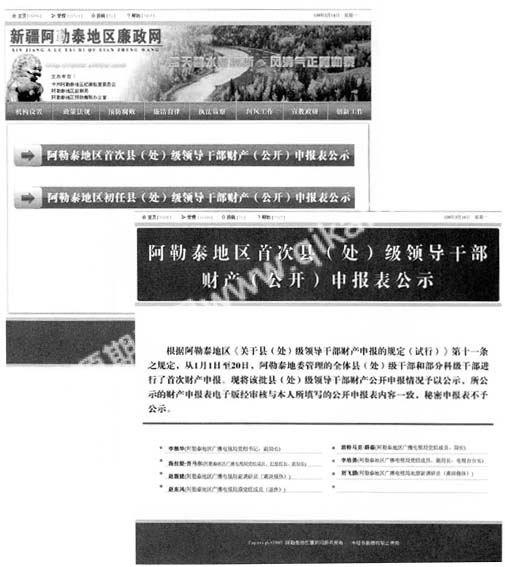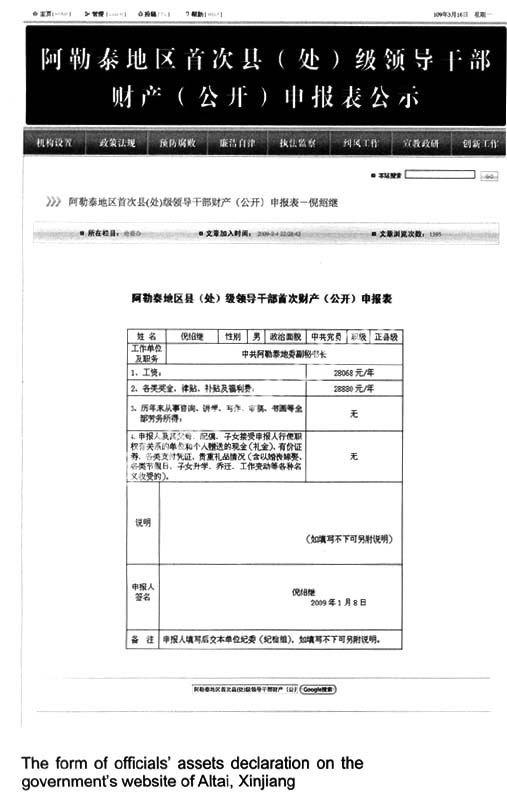Assets Declaration:Easier Said Than Done
2009-06-15
A national system may be set up “in due time” which will require civil servants to declare personal assets as a deterrent to corruption in China. Can the assets declaration system be available in China? Every people want to know.
The assets declaration system started from Sweden in the 18th century. In 1883 it was adopted by the Great Britains government and then gradually became popular in the developed countries. The Great Britain, the USA, South Korea and some other countries have already formed their own complete assets declaration systems.
Why the assets declaration system is popular in so many countries? Firstly, the antagonists can not give out reasons good enough to deny this system. Secondly, it is an effective and cheap way to fight corruption. Compared with other anti-corruption systems, it uses the officials self-restraint and the public supervision, which will save a large amount of administration fees of building the supervision, investigation and execution institutions for the government.
In the National Peoples Congress (NPC) and the Chinese Peoples Political Consultative Conference (CPPCC), the government officials assets declaration system once again received a lot of attention. It is known that the Central Commission of Discipline Inspection of the PRC (CCDI) is brewing the relevant regulations about the officials assets to be made public. The officials assets declaration system may be adopted in the whole country.
Last year, a pilot project to introduce the officials assets declaration was launched in Altai, Xinjiang and Cixi, Zhejiang, which the central government paid a lot of attention to. Ma Wen, Deputy Secretary of the CCDI told the media at the beginning of this year that the CCDI was paying attention to the pilot project in Altai. On February 28, Chinese premier Wen Jiabao appeared in the chat room of gov.cn, giving a positive review about the officials assets declaration. He also said that the government was preparing for the popularization of this system.
However, according to the latest report of CCDI, the government is still studying and discussing about how to spread this system and “no confirmed schedule is available”. Wu Bangguo, Head of National Peoples Congress Committee made the work report of the NPC on March 9, in which several laws including the Social Security Law was listed in the NPCs legislation plan this year. However, the law about officials assets declaration could not be seen as usual.

Pilot Project in Altai
The current officials assets declaration system in China mainly derives from two documents: the Regulations on the Income Declaration of the Cadres of CPC and Government (Division Level) in May 1995 and the Regulations on the Family Assets Declaration of the On-duty Cadres (Province and Department Level) in June 2001.
However, the effect of those two regulations was quite small. In the corruption cases exposed in recent years, no corrupt officials fell after their assets were open to the public according to those two regulations.

According to the analysis, at least 9 clauses of those two assets declaration regulations have the following defects: firstly, the scope of assets declaration is too small. It is only limited to the declaration-makers personal wage, bonus, allowance, subsidy and service income, which are a part of an officials total income, let alone the hidden income of the officials; secondly, there are no stipulations on the assets declaration of an official when he takes a post and when he leaves the post. Therefore, the increase of an officials assets and the source and legality of these assets can not be clarified. Some retired officials may escape from the supervision and investigation over his “gray income”.
In addition, the officials income declarations are collected by the human resources departments of the units or organizations the officials work for. The discipline inspection and supervision department does not receive those declarations. The contents of the declarations can only be seen by the relevant officials as references and are not made public. Whats more important is that those regulations are just the partys policies instead of laws. They have no authority and enforcement power.
Last May, the discipline inspection department of Altai, Xinjiang issued the Regulations on the Assets Declaration of the Cadres of Altai at Division Level (Trial Implementation). It stipulated that the assets declaration system would have been implemented since January 1, 2009. At the beginning of this year, the official website of Altai government published the assets declarations of 55 newly-appointed officials of this district. On February 17, 1054 officials assets declarations were published.
The regulations in Altai are quite different from the old ones. It for the first time requires the officials assets declaration to be made public. The ordinary people join in the supervision team. This is considered as an important step for China to break the anti-corruption impasse and to promote the political system reform.
The regulations in Altai spread the scope of declaration from “income” to “assets”, including the cash, gifts and valuable securities that the officials themselves and their close relatives receive from the units and persons relevant with the officials administration power, as well as the money that they received at wedding ceremonies, funerals, holidays and some other important dates. In consideration of the fact that some officials may make a future use of their power before their retirements, the officials income in the three years after their retirements is also included in the declaration. Those officials who intentionally make a false report of their assets will be punished according to the relevant laws.
According to the report, the experiment of officials assets declaration system in Altai has already got good effect. There is a certain deterrent function for the officials. In about half a year of after the issuance of the regulations, the discipline inspection department has received the cash and other things that the declaration makers turned in, with the total value of 760 thousand yuan (USD 111.3 thousand).
However, defects still haunt Altais regulations, which are rough and nontransparent. For example: none of the one thousand more officials who have already made assets declaration receive presents, which is quite abnormal in Chinas officialdom. The government only shows the officials income and cases of receiving presents to the public. The information about their vehicles, houses, stocks, securities, deposits and some other items concerning personal assets is considered as a secret and not open to the public. Therefore, though people support such a system, they still call it a “show” rather than a serious anti-corruption measure.
Hard Delivery of Law
On March 8, He Yong, Deputy Director of the CCDI said that the CCDI was studying the officials assets declaration system and “trying to work out relevant laws and regulations”. According to him, the experience in Altai is an important reference. However, the process of legislation is quite slow.
Han Deyun, an NPC member from Chongqing submitted the proposal about the “legislation of public servants assets declaration” in the NPC conference this year. This was the fourth time he made the same proposal. Actually, there was a similar proposal early in 1989. In 1994, the Standing Committee of the NPC listed the assets declaration law into the five-year legislation plan. But the law didnt come out after more than ten years and was even removed from the legislation plan.
The Law of Public Servants issued in 2005 has no clear regulations on the officials assets declaration. The Regulations of the PRC on the Disclosure of Government Information issued and implemented in 2007 stipulates that the administration authorities should not disclose the government information concerning state secrets, trade secrets and individual privacy.
According to the experts, it is hard to investigate and punish the public servants who have income with unidentified sources since there are no legal requirements of assets declaration. In 1988, the NPC issued the Amended Regulations of the PRC on Punishing the Bribery and Embezzlement Criminals which for the first time formulated the crime of holding a huge amount of property with unidentified sources. In 1997 the Criminal Law re-affirmed this crime. However, the punishment for this crime is quite lenient (five- to ten-year jail). Besides, most of those crimes are heard after the crimes of embezzlement and bribery, which means nearly no criminals were only accused of this crime in the past. The effective legal settlement to this crime depends on the complete assets declaration system.
There are always discussions about whether it is time to formulate the assets declaration system. On January 31, 2008, an official from the NPC said it was not a proper time to formulate this law. According to this official, the hurdles are the non-implementation of the registration identification system, the immature technological measures and the privacy rights.
Some experts analyzed that the privacy right was not a problem. Even the ordinary people have to tell the relevant departments their financial conditions in the aspects of taxation, counter-terrorism and anti-money laundering. The officials, as a special group of people with rights and power, should give up their privacy rights when there are contradictions between their privacy rights and the publics right to know.
The systematic hurdle really exists. In 2006 China issued the Anti-money Laundering Law, requiring the domestic financial institutions “to consummate the clients identity system, to build a system of saving clients information and deal information, to set up a system of reporting large-amount deals and suspicious deals”. This is considered as the base of implementing the assets declaration system. But China did not include the “non-financial institutions financial movements” into the anti-money laundering objects as suggested by the foreign countries. Besides, there are also technological hurdles in the anti-money laundering like the identification, financial file and some other problems.
The complicated situation of assets flow and individual income made it impossible to know every peoples information of income and expenditure. It is necessary for China to build an offense reporting system and some other democratic systems, which can help to understand the public servants financial situation and to provide proofs against the bribery, embezzlement and the other corruption crimes.
240 years ago, the Swedish could see their officials bill of taxation. In 1883, the Great Britains cabinet passed the first law of assets declaration in the world. At that time, no computer was available, let alone the modern identification system. So it is too absurd and ridiculous to take the immature technological measures as an excuse.
Biggest Hurdle from Officials
Actually, the fact that such a system will damage the government officials benefits is the biggest hurdle in implementing this system. The special team organized by the State Council of China to fight corruption once made a survey. According to the survey result, 93% of the interviewees thought that the biggest hurdle in the assets declaration system was from those having administration power and those benefiting from the corruption. For the corrupt officials whose crimes have not been revealed, supporting this system is like “lifting a rock only to drop it on their own toes”.
The officials and ordinary people have different opinions towards the experiment in Altai. An online survey showed that about 93.4% of people attending this survey supported this system and 90.3% thought it should be spread to the other places. However, the random survey of the officials in Altai and other cities in Xinjiang showed that about 70% of officials opposed the assets declaration system.
In 2005, an NPC member said: “the government officials assets should not be made public because they also enjoy the privacy rights.” Some people believe that the officials oppose the assets declaration system not for their privacy rights but for the illegal assets.
This year, a CPPCC member even said: “why people only want to open the officials assets to the public? Why not open the ordinary peoples assets?” The media ironically said that this guy “lowers the requirements on him and equates himself with the ordinary people”. These words are often heard in the confessions of the corrupt officials after they are arrested.
Though the highest-ranked leaders responded positively to the legislation of assets declaration, most of the NPC and CPPCC members kept silent about this proposal in the meeting. To tell the truth, the officials assets declaration system struck the heart of the hidden rules in Chinas officialdom. Meanwhile, most of the NPC and CPPCC members are government officials. It is not strange for them to keep silent.
The NPC is the administration institution with the legislation power in China. That explains why the hard delivery of the assets declaration law lasts so long.
Furthermore, there are certain “political, economic and social risks” in building the officials assets declaration system, especially when there is a big income gap in Chinas society. “The unrest may arise,” some people say.
In conclusion, the officials assets declaration system is available only when the top leaders of China have strong determination and lead the way personally. Otherwise, the officials assets declaration system, which many countries have adopted as a powerful weapon to fight corruption, may have many problems and an unclear outlook in China.
